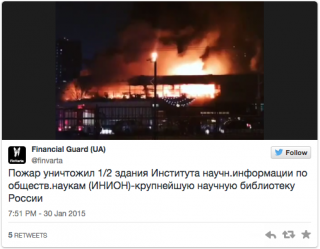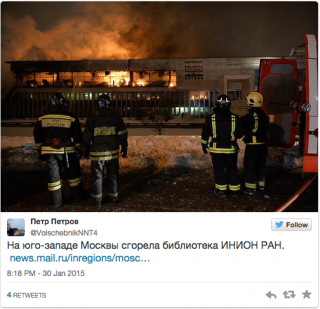February 3, 2015
“The books did not suffer.” Firefighters rescue 85% of Moscow library collection
by Kirsten Reach
 This weekend, we lost the building that housed one of Russia’s largest libraries. The Institute of Scientific Information on Social Sciences (Inion) in Moscow, a library that has been compared to the U.S. Library of Congress, caught fire on Friday and burned through Saturday, well over seventeen hours. Two thousand square meters (21,500 square feet) of the building were devoured by flames and a thousand square meters (1,764 square feet) of the roof collapsed.
This weekend, we lost the building that housed one of Russia’s largest libraries. The Institute of Scientific Information on Social Sciences (Inion) in Moscow, a library that has been compared to the U.S. Library of Congress, caught fire on Friday and burned through Saturday, well over seventeen hours. Two thousand square meters (21,500 square feet) of the building were devoured by flames and a thousand square meters (1,764 square feet) of the roof collapsed.
The modern building, which became home to the library in 1969, is not likely to be saved. But many, many books have survived.
The library is home to fourteen million volumes, and an estimated 15% of them are now lost. But that’s a surprisingly low percentage, considering the size of the fire and the water damage from extinguishing efforts. Nearly two hundred firefighters took on this building, and they were careful to save everything they could.
Yuri Pivovarov, Director of the Institute, said in an interview with the BBC, “What is important is that they saved the books, the books did not suffer.”
Founded in 1918, this library is not only the largest social science library in Russia, it contains the most complete collection of documents for the League of Nations, UNESCO, and the United Nations. It is home to a rich collection in the Slavic language, including many Medieval texts. Alexander Visly, director of the Russian State Library, told the New York Times that rare volumes on economics, philosophy, and Marxism-Lenonism were brought to the country as war trophies.
Only a fraction of the collection has been digitized, according to Pivovarov. Vladimir Fortov, president of the Russian Academy of Sciences, compared the cultural loss to Chernobyl.
 Experts suggest the cause of the fire was an electrical short-circuiting, not arson. RT sent a drone to investigate the damage, which you can view here.
Experts suggest the cause of the fire was an electrical short-circuiting, not arson. RT sent a drone to investigate the damage, which you can view here.
This is a significant loss to the international study of social science, but it’s fortunate that so many texts were rescued and that no librarians were injured.
Kirsten Reach is an editor at Melville House.